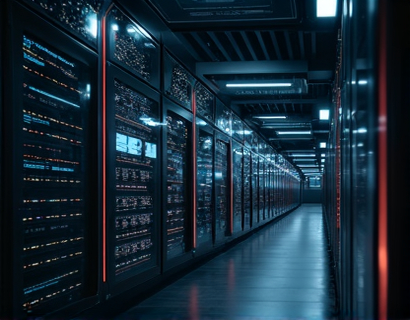Autonomous AI Agents: Revolutionizing Business Efficiency Through Multi-Chain and Cross-Technology Automation
In the rapidly evolving digital landscape, businesses are constantly seeking innovative solutions to enhance efficiency and maintain a competitive edge. One of the most transformative advancements in this realm is the emergence of Autonomous AI Agents. These intelligent entities are designed to operate seamlessly across multiple blockchains and various technologies, automating complex tasks and optimizing workflows with advanced AI solutions. This article delves into the capabilities, benefits, and future potential of Autonomous AI Agents, providing businesses with insights into how these agents can revolutionize their operations.
Understanding Autonomous AI Agents
Autonomous AI Agents are sophisticated software entities that can perform tasks with minimal human intervention. These agents leverage machine learning, natural language processing, and other AI technologies to understand, adapt to, and execute tasks in dynamic environments. The key feature of these agents is their ability to operate across different blockchain platforms and technological ecosystems, ensuring a high level of flexibility and interoperability.
The foundation of Autonomous AI Agents lies in their advanced algorithms and data processing capabilities. These agents can analyze vast amounts of data, identify patterns, and make decisions based on predefined criteria. By integrating with multiple blockchains, they can access and manipulate data from various sources, enhancing their functionality and utility. This multi-chain capability is crucial for businesses that operate in decentralized environments or need to integrate data from multiple blockchain-based systems.
Multi-Chain Automation
One of the most significant advantages of Autonomous AI Agents is their ability to automate processes across multiple blockchains. Traditional automation solutions often struggle with interoperability between different blockchain platforms, leading to fragmented systems and increased operational complexity. Autonomous AI Agents bridge this gap by providing a unified automation framework that can interact with various blockchains seamlessly.
For instance, in a supply chain management scenario, an Autonomous AI Agent can monitor inventory levels on one blockchain, trigger smart contracts on another to automate purchases, and update records on a third blockchain to ensure transparency and traceability. This multi-chain automation not only streamlines processes but also reduces the risk of human error and enhances overall efficiency.
Cross-Technology Integration
Beyond blockchain, Autonomous AI Agents are designed to integrate with a wide range of technologies, including IoT devices, cloud platforms, and traditional enterprise systems. This cross-technology integration allows businesses to create a cohesive and intelligent ecosystem where data flows freely and processes are optimized in real-time.
Consider a manufacturing company that uses IoT sensors to monitor equipment performance. An Autonomous AI Agent can collect data from these sensors, analyze it to predict maintenance needs, and automatically place orders for spare parts through integrated e-commerce platforms. This end-to-end automation ensures that the manufacturing process remains uninterrupted, reducing downtime and maintenance costs.
Enhancing Business Processes
The applications of Autonomous AI Agents extend to various business functions, each benefiting from the agent's ability to automate and optimize tasks. Here are some key areas where these agents can make a significant impact:
- Finance and Accounting: Autonomous AI Agents can automate financial reporting, reconciliations, and compliance checks by interacting with multiple blockchain ledgers and financial systems. This reduces the time and resources required for manual processing and minimizes the risk of errors.
- Human Resources: HR processes such as recruitment, onboarding, and performance management can be streamlined using AI agents that interact with multiple databases and systems. These agents can handle tasks like resume screening, scheduling interviews, and updating employee records, freeing up HR professionals to focus on strategic initiatives.
- Customer Service: AI agents can enhance customer service by providing 24/7 support through chatbots and virtual assistants. These agents can handle a wide range of queries, from basic information requests to complex issue resolutions, by accessing data from multiple sources and integrating with customer relationship management (CRM) systems.
- Logistics and Supply Chain: As mentioned earlier, Autonomous AI Agents can optimize supply chain operations by automating inventory management, order processing, and shipping logistics. By integrating with blockchain for transparency and IoT for real-time monitoring, businesses can achieve higher efficiency and reliability in their supply chains.
Benefits of Autonomous AI Agents
The adoption of Autonomous AI Agents offers numerous benefits for businesses, including:
1. Increased Efficiency: By automating repetitive and time-consuming tasks, these agents free up human resources to focus on higher-value activities, leading to overall process efficiency.
2. Cost Reduction: Automation reduces the need for manual intervention, lowering labor costs and minimizing errors that can result in additional expenses.
3. Enhanced Decision-Making: With real-time data analysis and insights, businesses can make informed decisions quickly, improving operational agility and responsiveness.
4. Improved Compliance: Autonomous AI Agents can ensure that processes adhere to regulatory requirements by automating compliance checks and reporting, reducing the risk of non-compliance.
5. Scalability: These agents can handle increasing workloads without a proportional increase in resources, making them ideal for businesses experiencing rapid growth.
Challenges and Considerations
While the benefits of Autonomous AI Agents are substantial, businesses should be aware of certain challenges and considerations:
1. Security and Privacy: Ensuring the security of data and maintaining privacy are critical. Businesses must implement robust security measures to protect against potential threats and comply with data protection regulations.
2. Integration Complexity: Integrating Autonomous AI Agents with existing systems can be complex, requiring careful planning and expertise. Businesses should assess their current infrastructure and work with experienced partners to ensure a smooth integration.
3. Talent Acquisition: Finding skilled professionals who can develop, deploy, and manage these agents is essential. Companies may need to invest in training or hire specialized talent to leverage the full potential of AI agents.
4. Ethical Considerations: The use of AI raises ethical questions, particularly around automation and job displacement. Businesses should approach AI adoption with a responsible and ethical mindset, focusing on augmenting human capabilities rather than replacing them.
Future Prospects
The future of Autonomous AI Agents looks promising, with ongoing advancements in AI, blockchain, and other technologies. Here are some trends and developments to watch:
1. Advancements in Machine Learning: Continuous improvements in machine learning algorithms will enhance the capabilities of AI agents, making them more intelligent and adaptable.
2. Decentralized AI: The convergence of AI and decentralized technologies, including blockchain, will lead to more secure and transparent AI systems.
3. Edge Computing: The rise of edge computing will enable AI agents to process data closer to the source, reducing latency and improving real-time decision-making.
4. Regulatory Frameworks: As AI becomes more prevalent, regulatory bodies will develop frameworks to govern its use. Businesses should stay informed and proactive in compliance efforts.
5. Collaborative Ecosystems: The development of collaborative ecosystems where multiple AI agents work together to solve complex problems will become more common, driving innovation and efficiency.
Conclusion
Autonomous AI Agents represent a significant leap forward in business automation and efficiency. By seamlessly integrating across multiple blockchains and technologies, these agents offer a powerful solution for businesses looking to optimize their operations and gain a competitive edge. While there are challenges to consider, the potential benefits are substantial, making the adoption of AI agents a strategic priority for forward-thinking organizations. As the technology continues to evolve, businesses that embrace Autonomous AI Agents will be well-positioned to thrive in the digital age.










































